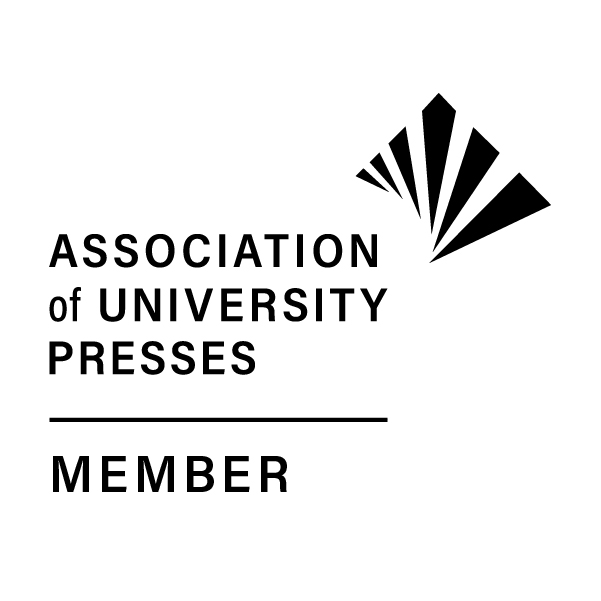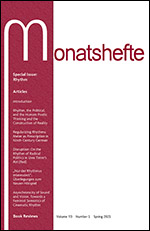|


|

Subscribe
Read the Journal Online
Submission Guidelines
Editorial Board
Receive Email Updates
Advertise in Monatshefte
Indexes/Abstracts
Current Issue TOC
Back Issues TOC
Monatshefte 2022 Subscription Rates
Institutions:
print & online $271
online only $233
Individuals:
print & online $103
online only $86
Non U.S. Postage (no postage charges for online-only subscriptions)
Airmail: add $40/yr.
Canadian Subscribers: add 5% GST. |
Monatshefte
Volume 101, Number 4, Winter 2009 Table of Contents
Articles
Will Hasty
The Singularity of Aura and the Artistry of Translation: Luther’s Bible as Artwork
Abstract:
The present essay argues that Martin Luther’s Bible translation is an important moment in the cultural history of aura as conceptualized by Walter Benjamin. Luther’s vernacular New Testament, along with the larger translation project of which it was the auspicious beginning, is one of the most important and influential of translations, and in his “Sendbrief vom Dolmetschen” (1530), Luther provides crucial information about how he approached his translation that is important for an appreciation of its distinctive aura. We shall see that, in the “Sendbrief,” Luther conceives of his Bible as a work of art, and of his translating activity in terms of a very individual kind of artistry. This view of Luther’s Bible within the context of Benjamin’s conception of aura contributes to the understanding both of the cultural importance of the early modern Bible translation and also of the influential early 20th century essay on the artwork in the age of its technical reproducibility. (WH)
Brian Tucker
“Die Stunde der Entscheidung”: Ordeal and Uncertainty in Kleist’s “Der Zweikampf”
Abstract:
Kleist’s “Der Zweikampf” (1811) depicts the use of trial by combat to decide between two contradictory claims to the truth. The duel’s aftermath, though, represents a second form of medieval proof, the trial by ordeal, in which wounds communicate guilt and innocence. While many readers take “Der Zweikampf” as a story about the pitfalls of ambiguity and the futility of hermeneutics, this article argues that the uncertainty derives not from ambiguous messages or obscure signs. It occurs, rather, when two forms of medieval proof deliver clear but mutually exclusive results and divine judgment undermines itself through an excess of legible judgments. Kleist uses this conflict to demonstrate that an element of human decision cannot be removed from adjudication. Although the judicial duel seeks to pass difficult decisions to divine authority, the court must always decide whether a particular instance of combat conforms to the norm of divine judgment. (BMT)
Esther K. Bauer
Penetrating Desire: Gender in the Field of Vision in Thomas Mann’s Der Zauberberg and Christian Schad’s Graf St. Genois d’Anneaucourt
Abstract:
Reading together Thomas Mann’s novel Der Zauberberg (1924) and Christian Schad’s painting Graf St. Genois d’Anneaucourt (1927), reveals that the writer and artist mirror each other in highlighting the sexual human body and subverting bourgeois notions of gender. At a time when the gender debate revolved around the question of whether masculinity and femininity were essential qualities or social constructions, Mann and Schad presented the body as the site where the gender category could be overcome. Their renditions of the body attract a gaze—in Mann’s case, the main protagonist’s, in Schad’s, the viewer’s—striving to see underneath the surface of the skin in search of knowledge and aesthetic and sexual pleasure. The highly corporeal desire driving this gaze is gender-neutral, and consequently, categories such as homosexual, heterosexual, or androgynous that have been used to describe these works anchoring them in the traditional gender matrix, miss their true subversive potential. (EB)
Urs Büttner
Urteilen als Paradigma des Erzählens. Dürrenmatts Narratologie der Gerechtigkeit in seiner Geschichte Die Panne (1955/56)
Abstract:
Friedrich Dürrenmatt is an author well-known for engaging issues of law and literature. Using the example of his popular short story “Die Panne” this paper argues that judging means making a decision in favor of one particular version of what happened. Telling a story goes along with selecting only certain facts, using them to motivate a specific result, and thereby excluding others. This idea is performed in the trial in Dürrenmatt’s story when the case is told in versions which portray the accused as hero, perpetrator, and victim. The unexplained remainder of facts draws each judgment into question since there are possible other stories. Only god, in case he exists, could render a really just judgment since only he could tell a story considering all facts. Dürrenmatt provokes the reader of his story with his apparently unjust judgment to think about the question of justice and search for other possible stories. (UB; in German)
Personalia
Introduction, German Departments in the U.S.A., German Departments in Canada, Promotions, New Appointments, Visitors, Retirements, Necrology, Doctoral Dissertations, Summary
Book Reviews
Armbrust, Heinz J. und Gert Heine, Hrsg., Wer ist wer im Leben von Thomas Mann? (Hans Rudolf Vaget)
Becker-Cantarino, Barbara, Meine Liebe zu Büchern. Sophie von La Roche als professionelle Schriftstellerin (Todd Kontje)
Fuchs, Anne, Phantoms of War in Contemporary German Literature, Films and Discourse: The Politics of Memory (Christiane Schönfeld)
Gerstenberger, Katharina and Patricia Herminghouse, eds., German Literature in a New Century: Trends, Traditions, Transitions, Transformations (Stephen Brockmann)
Hauser, Claudia, Politiken des Wahnsinns. Weibliche Psychopathologie in Texten deutscher Autorinnen zwischen Spätaufklärung und Fin de siècle (Elizabeth Ametsbichler)
Hermanns, Silke, Trümmer (in) der Erinnerung. Strategien des Erzählens über die unmittelbare Nachkriegszeit (Volker Kaiser)
Holmgren, Janet Besserer, The Women Writers of Schiller’s Horen: Patrons, Petticoats, and the Promotion of Weimar Classicism (Cora Lee Kluge)
Joachimsthaler, Jürgen und Martin Grimberg, Poetik vs. Grammatik (Jürgen Macha)
Karsch, Margret, “das Dennoch jedes Buchstabens”. Hilde Domins Gedichte im Diskurs um Lyrik nach Auschwitz (Gerrit-Jan Berendse)
Keppler, Stefan, Grenzen des Ich. Die Verfassung des Subjekts in Goethes Romanen und Erzählungen (Dirk Kemper)
Klausnitzer, Ralf und Carlos Spoerhase, Hrsg., Kontroversen in der Literaturtheorie/Literaturtheorie in der Kontroverse (Stephan Jaeger)
Kühn, Dieter, Gertrud Kolmar. Leben und Werk, Zeit und Tod (Carola Daffner)
Lacheny, Marc, Karl Kraus lecteur de Johann Nestroy: Pour une autre vision de l’histoire littéraire et théâtrale (Jacques Le Rider)
Lüdemann, Susanne, Hrsg., Der Überlebende und sein Doppel. Kulturwissenschaftliche Analysen zum Werk Elias Canettis (Kata Gellen)
Mackrodt, Cori, Aufbrechende Schrift. Textgenetische Lektüren von Friedrich Hölderlins “Der Einzige” (Alexander Honold)
Reinhart, Max, ed., Early Modern German Literature 1350–1700 (Robert G. Sullivan)
Sayner, Joanne, Women Without a Past? German Autobiographical Writings and Fascism (Elaine Martin)
Spicker, Johannes, Oswald von Wolkenstein. Die Lieder (Hendrikje Lehmann)
Stein, Peter und Hartmut Stein, Hrsg., Chronik der deutschen Literatur. Daten, Texte, Kontexte (Matthew Lange)
Tafazoli, Hamid, Der deutsche Persien-Diskurs. Von der frühen Neuzeit bis in das neunzehnte Jahrhundert (Kamakshi Murti)
Tang, Chenxi, The Geographic Imagination of Modernity: Geography, Literature, and Philosophy in German Romanticism (Brian Tucker)
Thomas, Neil, Wirnt von Gravenberg’s Wigalois. Intertextuality and Interpretation (Silvia Reuvekamp)
Vosskamp, Wilhelm, Der Roman des Lebens. Die Aktualität unserer Bildung und ihre Geschichte im Bildungsroman (Gerhart Hoffmeister)
Wende, Waltraud, Hrsg., Der Holocaust im Film. Mediale Inszenierung und kulturelles Gedächtnis (Heike Polster)
Werner, Thomas, Den Irrtum liquidieren. Bücherverbrennungen im Mittelalter (Cornelia Ortlieb)
Index Volume 101 (2009)
|


